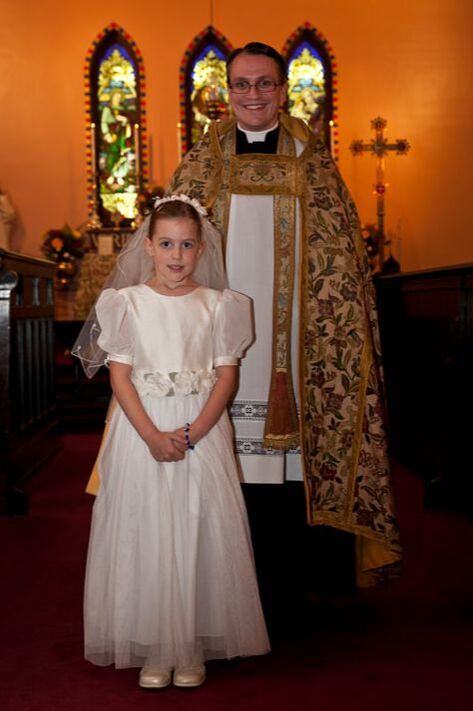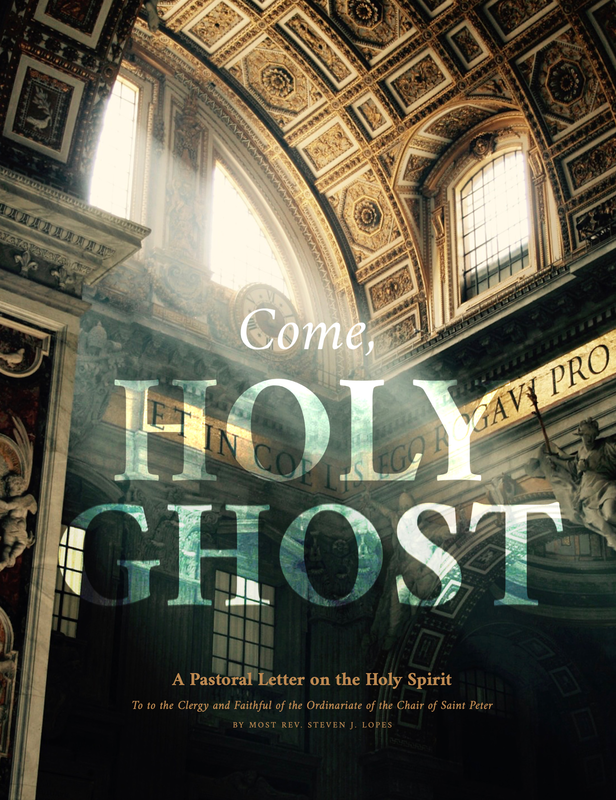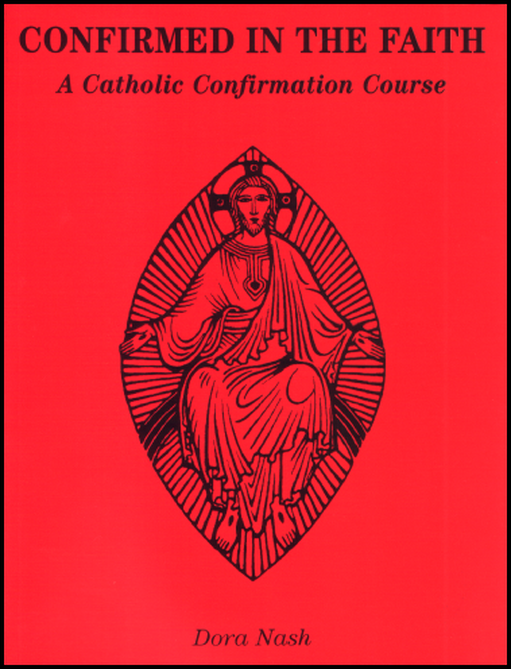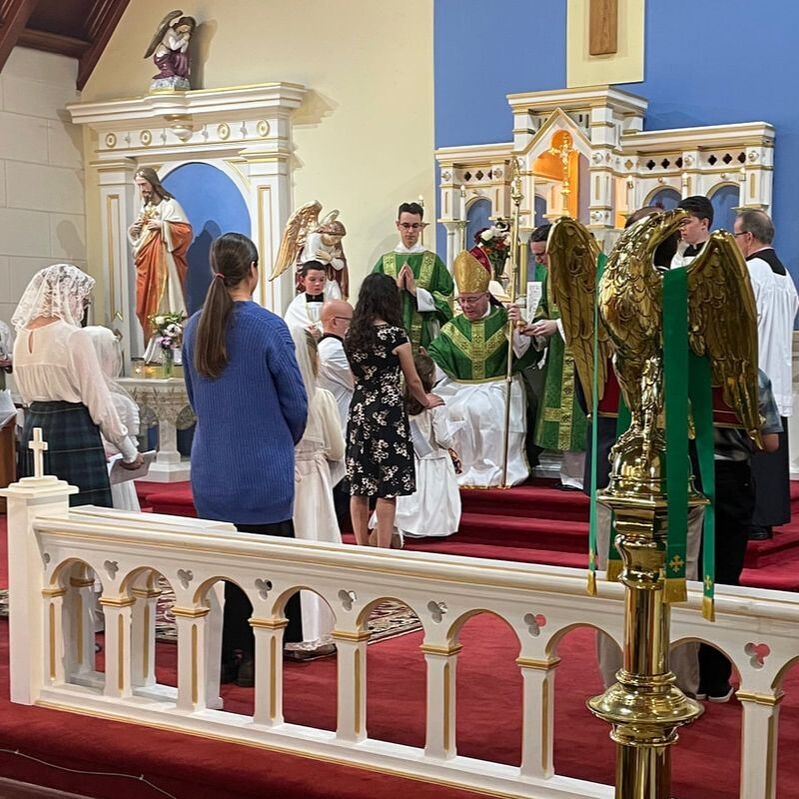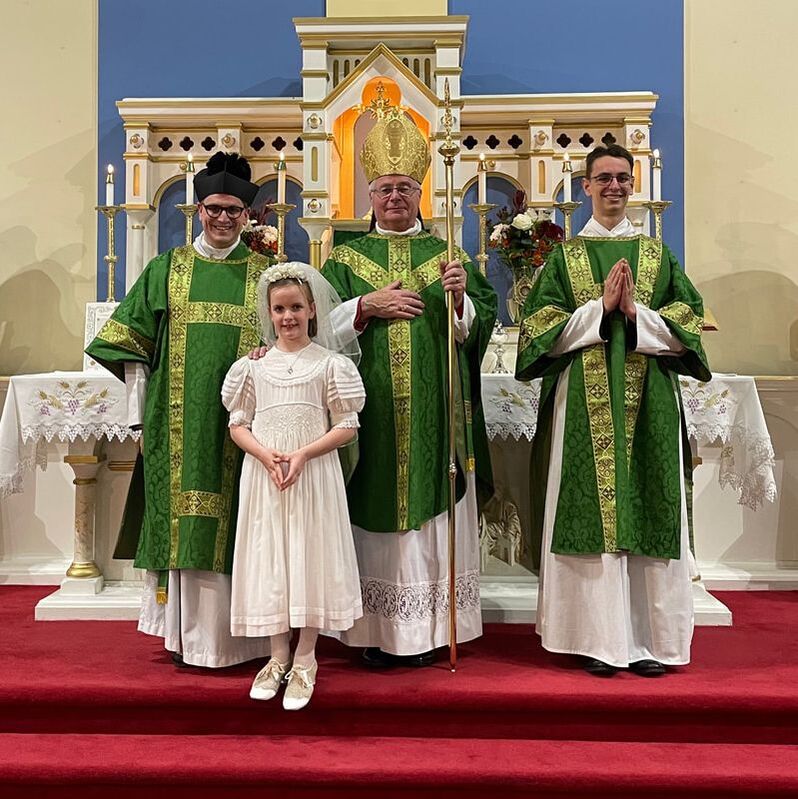Confirmation
|
THOSE WHO HAVE BEEN BAPTISED continue on the path of Christian initiation through the Sacrament of Confirmation. In this sacrament they receive the Holy Spirit whom the Lord sent upon the apostles on Pentecost. This giving of the Holy Spirit conforms believers more fully to Christ and strengthens them so that they may bear witness to Christ for the building up of his Body in faith and love. They are so marked with the character or seal of the Lord that the Sacrament of Confirmation cannot be repeated.
These notes are intended to help guide you through the process of seeking the Sacrament of Confirmation at St John Henry’s. Adult Confirmations, in the main, take place whenever an adult is baptised, or is received into the Roman Catholic Church. Due catechetical instruction and preparation takes place before the Sacrament of Confirmation can be given, and must always be preceded by the Sacrament of Confession. For further information on the process of entering (or, if you are baptised, completing your sacramental initiation within) the full communion of the Catholic Church, or please speak to Fr Kenyon. |
Confirmation and First Holy Communion in the Ordinariate
|
At St John Henry’s, for those other than adults, the Sacrament of Confirmation and First Holy Communion are given in that sacramental order. This was, historically, the order of the sacraments of initiation after Holy Baptism. This has been preserved in the Anglican tradition since the 16th century, and is now maintained in the practice of the Ordinariate of the Chair of St Peter (and, it should be noted, in the Diocese of Victoria). Please read Bishop Lopes’ Pastoral Letter on the Holy Spirit, Come, Holy Ghost (click on the image on the right), for further reflection and information.
If your child has reached (or even surpassed) the age of reason and discretion (defined by the Catechism as age seven), a Confirmation Registration Form, available at the top of the page, will need to be completed in order to register your child for Confirmation and First Communion preparation classes, which will need to be arranged prior to the visit of the bishop, or his delegate, who will administer the Sacrament of Confirmation. Our preparation classes consist of six sessions (with an additional final practical session, in church) covering Confession, Confirmation, and the Holy Eucharist. Attendance is mandatory if your child wishes to receive these Sacraments. Ordinarily, each year we begin the classes in early September, with the celebration of the Sacraments towards the end of October. The classes adapt two courses to suit our needs: Bread of Life: Preparing for First Confession and First Communion by Canon Martin Edwards, Parish Priest of St Mary Magdalen, Wandsworth, in the Diocese of Southwark, England, and Confirmed in the Faith: A Catholic Confirmation Course, written by the late Mrs Dora Nash, former Head of Religious Education and Senior Tutor at The Oratory School, Reading, England. The principle upon which the Ordinariate’s practice must be founded... is the essential bond between the Sacraments of Confirmation and Holy Communion. Ideally, therefore, Confirmation and First Holy Communion are conferred in the same celebration... The readiness of a child to receive these Sacraments of Initiation - which necessarily follows the experience of the abundant mercy of God in the Sacrament of Confession - is determined by the child’s parents and Pastor, who together share the responsibility of nurturing the child in the Church’s faith and assisting him or her to grow into the stature of the fullness of Christ (cf. Ephesians 4.13). Normally, therefore, a child is to be admitted to Confirmation and the Eucharist around the age of discretion, being sometime between the ages of 7 and 11. - Bishop Steven Lopes |
Questions and Answers
Why does St John Henry’s celebrate Confirmation and First Communion at the same event?
In the early Church, Christian initiation was celebrated together as a single event. The person was immersed into the waters of Baptism, anointed with chrism, and shared in the Eucharistic meal. Over time, and for many reasons, the celebration of these sacramental rituals became separated from one another. In the renewal of the sacraments which was mandated by the Second Vatican Council, the Church was invited to restore the celebrations of the sacraments of Christian initiation to their original order – Baptism, Confirmation, and the Eucharist. This restored order helps us recognise that sharing in the Eucharist completes our initiation into the Church.
What does the Church say about linking these two sacraments?
In article 1275 the Catechism of the Catholic Church articulates the inseparable nature of the sacraments of initiation as follows: ‘Christian initiation is accomplished by three sacraments together: Baptism, which is the beginning of new life; Confirmation, which is its strengthening; and the Eucharist, which nourishes the disciple with Christ’s Body and Blood for his transformation in Christ’.
Doesn’t the Church require a certain age for Confirmation?
Both the Rite of Confirmation and Canon Law (Canon 891) set the age of discretion (age seven) as the age for Confirmation. The age for Confirmation varies from diocese to diocese, sometimes even from parish to parish. Regardless of age, Confirmation is always a sacrament of initiation. The important thing to remember is that sacraments are not about age alone, they are about growing in faith, and about sharing in God’s grace.
In the early Church, Christian initiation was celebrated together as a single event. The person was immersed into the waters of Baptism, anointed with chrism, and shared in the Eucharistic meal. Over time, and for many reasons, the celebration of these sacramental rituals became separated from one another. In the renewal of the sacraments which was mandated by the Second Vatican Council, the Church was invited to restore the celebrations of the sacraments of Christian initiation to their original order – Baptism, Confirmation, and the Eucharist. This restored order helps us recognise that sharing in the Eucharist completes our initiation into the Church.
What does the Church say about linking these two sacraments?
In article 1275 the Catechism of the Catholic Church articulates the inseparable nature of the sacraments of initiation as follows: ‘Christian initiation is accomplished by three sacraments together: Baptism, which is the beginning of new life; Confirmation, which is its strengthening; and the Eucharist, which nourishes the disciple with Christ’s Body and Blood for his transformation in Christ’.
Doesn’t the Church require a certain age for Confirmation?
Both the Rite of Confirmation and Canon Law (Canon 891) set the age of discretion (age seven) as the age for Confirmation. The age for Confirmation varies from diocese to diocese, sometimes even from parish to parish. Regardless of age, Confirmation is always a sacrament of initiation. The important thing to remember is that sacraments are not about age alone, they are about growing in faith, and about sharing in God’s grace.
|
How will my child be prepared for Confirmation?
In this older order, Confirmation preparation is integrated into the preparation for First Holy Communion. This means that the close connection between Baptism and Confirmation is emphasised, while recognising the importance of the Eucharist as the culmination of Christian initiation. Will my child be learning about the Holy Spirit? Naturally, as your child continues to participate in religious education, he or she will continue to learn more and more about the Holy Spirit’s action in our lives. The preparation course in which your child will participate teaches about the power of the Spirit and the special gifts of the Spirit. Just as your child was first empowered by the Spirit in Baptism, your child will continue to grow in the Spirit through the grace of Confirmation. How will I know if my child is ready for Confirmation? Readiness for Confirmation cannot be separated from readiness for the Eucharist, and sacramental readiness is never about learning, but about faith. As your child prepares for Confirmation and First Holy Communion, here are three things to keep in mind: 1. Sacraments are always a beginning. As your child matures in faith, he or she will grow in his or her understanding of Confirmation and experience of the Eucharist. 2. The Eucharist is the culmination of the three Sacraments of Initiation. Your child is now welcomed as a fully participating member of the Church. |
3. At any age, completion of the Sacraments of Initiation – Baptism, Confirmation, and the Eucharist – in no way signals graduation. Rather it is the beginning of a lifetime of being nourished at the altar of the Lord.

